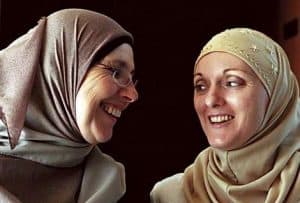The Sun-Herald are reporting today that two Muslim women will be running for the seat of Auburn in Sydney’s South West.
A FORMER high school principal and a local councillor will become the first Muslim women to be aligned with mainstream political parties when they contest the March 24 state election.
Muslim converts Silma Ihram, who will run as a Democrat, and Malikeh Michaels, a Green, will contest the safe Labor seat of Auburn, held by Barbara Perry.
We have commented on the broader issue of Muslim political involvement in the past. One of the key concerns has always been that it could send the wrong message for a Muslim candidate to run on what they or others will promote as an “Islamic platform” designed to capture the “Muslim vote”. This furthers the perception of Islam as a “political ideology”; which seems to mean a potpourri of mostly Leftist economic nostrums wrapped up in some Rightist social conservatism and then rebranded as “Islam” with a foreign policy that starts with opposition to Israel and ends with opposition to America.

However, there is hardly a definitive Islamic position on many of the contemporary political issues we face — despite the best efforts of some Muslim leaders to suggest otherwise. Therefore, the idea of a “Muslim vote” is an intrinsically problematic one because on many matters of political importance, Islam has no position at all, other than requiring people to make the subjectively weigh the maslaha (benefit) of a particular course of action. For example, what is Islam’s position on carbon credits? Does Islam have a position on government subsidies for hybrid cars? What is the Islamic position on the age of consent? And so on.
Therefore, it is reassuring to read that Silma Ihram — one of few Muslim leaders in this country who has actually led people — has sought to distance herself from being The Muslim Candidate running on a Muslim Platform:
Ms Ihram, 54, former principal and founder of Noor Al Houda Islamic College in Strathfield, decided against running in Lakemba because she feared she would be labelled a token Muslim candidate and did not want to be linked to controversial Muslim leader Sheik Taj el-Din al Hilaly.
I know voting and participation in politics is a contentious issue but I would be interested in hearing what readers think. Do you think Muslim engagement with the political process is a good thing? And, if so, should Muslims run independently on what they cast as an “Islamic platform” or is it better for Muslims to run under the auspices of a particular political party (as the two Muslims mentioned in the article are doing)?
